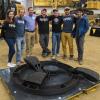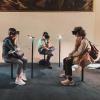To advance the technology needed to create sustainable housing solutions for trips to the moon, Mars, and beyond, as well as here on Earth, NASA is conducting the 3D-Printed Habitat Challenge. Teams compete to construct dwellings out of local, indigenous, or recyclable materials, and designs are out of this world.
Pamela Rentz is a freelance writer and editor who has been working in marketing communications and PR for technology—from startups to Fortune 100 outfits—for more than eighteen years. She’s a regular contributor to TechWell.com and GardenTraveler.com. She’s also a Georgia Master Gardener and, when not writing, can usually be found in a garden somewhere.
All Stories by Pamela Rentz
Merriam-Webster just added 640 new words to its dictionary, in addition to the more than 840 entries added in September. While you're learning new language, check out the Sideways Dictionary, a crowd-sourced collection of definitions. There are a lot of software terms there, so see how people define "agile" and "VPN."
When most of us think of virtual reality, what comes to mind is fitting on a headset to experience a computer-generated simulation of a three-dimensional environment. However, the recent TED conference had a different “shared immersive reality” experience that doesn’t require headgear. Here's what's new with VR tech.
Being unable to think of what to write can happen to anyone. Maybe your assignment is to contribute a blog post for the company website, draft a white paper, or produce design documents or other materials. What do you do? Here are some helpful suggestions for unblocking writer's block and getting started.
As more medical devices are developed that employ artificial intelligence and machine learning software that can learn from real-world feedback and adaptation, the FDA announced it is taking steps to explore a new medical device regulatory framework. The goal is creating safe, beneficial, innovative medical products.
In addition to the many ways artificial intelligence and machine learning technologies are changing our everyday life, can they also help save our world? To safeguard the lives of millions of species in our world today, the campaign for Earth Day 2019 is “Protect Our Species,” and AI is already having an impact.
It’s fitting that the first exascale supercomputer in the United States—with a performance of one exaflop, or a quintillion calculations per second—will have the name “Aurora,” the mythical Roman goddess of the dawn. After all, it’s the dawn of a new era in high-performance computing.








